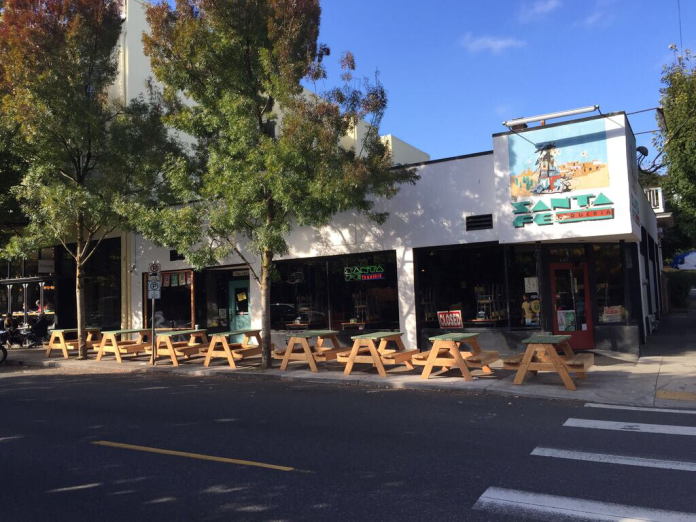On Friday morning, heading into the first full weekend of summer and 53 days since Governor Jay Inslee announced a phased reopening for Washington, Seattle announced expedited permitting for outdoor cafes and retail. In a statement from Mayor Jenny Durkan and Councilmembers Dan Strauss and Alex Pedersen, the City outlined several efforts to ease constraints on businesses by allowing them to operate on adjacent City-owned sidewalks and streets. The Seattle Department of Transportation is accepting applications for permits, and legislation to the city council will follow up to expedite the process by suspending the two-week public comment period and waive fees.
Three permits will be available for a six-month period. Temporary Outdoor Cafe Permits allow restaurants to open seating on the sidewalk or in the curb space parking. Temporary Merchandise Display Permits allow retail businesses to expand operations onto the sidewalk and adjacent parking spaces. And Temporary Vending Permits are for food trucks and other vendors to operate on new street and sidewalk locations. Restaurants that wish to serve alcohol on sidewalks or curb parking spaces will need to obtain a separate permit from the Washington State Liquor and Cannabis Board.
In the announcement, the City offered a series of Toolkits to describe the requirements of Phase 2 opening for various types of businesses. Toolkits contain an overview of Phase 2, links to City and State resources, and industry-specific information. The Domestic Services Toolkit, for instance, includes references to employer-owned vehicles and cancelling appointments in households where a member has Covid symptoms. The In-Store Retail Toolkit specifies limited access to a single front door and placing signage throughout the establishment.
The Toolkits are an interesting addendum to the announcement of expedited permits. They seem to cloak how the expedited permits are narrow in very interesting ways.
For example, Portland is encouraging neighborhood businesses to work together and develop a combined plan for using the nearby right-of-way. The Portland Bureau of Transportation offers guidance that ranges from taking over a single parking space to opening an entire primary thoroughfare for a retail and restaurant plaza.

Seattle’s program stops at the single parking space and even that is not available in large parts of the city. With a permit, sidewalk seating is permitted everywhere, but the parking space option is not available to establishments on Principal Arterial Streets. Outside of Downtown Seattle, such roads have limited retail. In Downtown and Belltown, almost every block is a Principal Arterial.

Fees and permits have not been waived for expanding businesses on private property. Other communities have allowed conversion of private parking lots to dining. Seattle still requires permanent, temporary, or intermittent use permits for businesses that expand on their own land. A temporary use permit only lasts four weeks and intermittent use permits last only several days a week. The fee for these permits is $350 and can take up to three weeks “depending on the quality of the permit application,” according the Seattle Department of Construction and Inspections. The department has promised to try and expedite these permits, however, with a priority for permits in traditionally underserved areas.
The expedited permits also do not waive the requirements of historic district approval. While meetings are interrupted by Covid, the Department of Neighborhoods is permitted to make approvals. Via email, DON staff stated that they expected such approvals to come within the expedited turnaround time from the Mayor’s announcement. District guidelines encourage business vitality and generally permit outdoor seating. Restaurants in Pioneer Square, International District, Columbia City, and Ballard would be required to receive this extra layer of scrutiny.
As with many parts of this pandemic, the City is playing catchup. While this could be excused earlier in the crises or following unpredictable events, we have known for a while restaurants and retail needed to get outside and summer tends to be on a predictable schedule. A Friday morning announcement after long delays and continued reliance on process begins to look like neglect. Moving into the next few months when fiscal supports and good will taper off, these delays could make the City as culpable for the economic crisis as the virus.
Ray Dubicki is a stay-at-home dad and parent-on-call for taking care of general school and neighborhood tasks around Ballard. This lets him see how urbanism works (or doesn’t) during the hours most people are locked in their office. He is an attorney and urbanist by training, with soup-to-nuts planning experience from code enforcement to university development to writing zoning ordinances. He enjoys using PowerPoint, but only because it’s no longer a weekly obligation.



